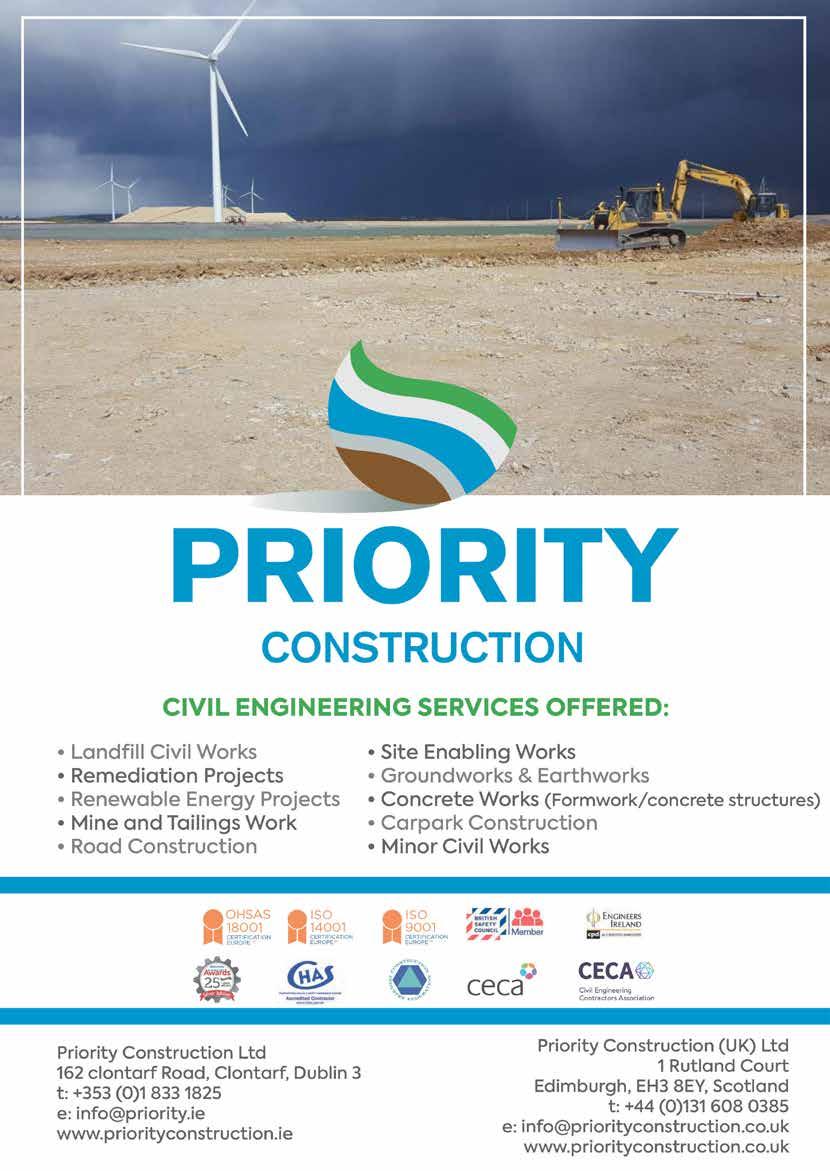BIM ADDING TANGIBLE VALUE

IRELANDS HOUSING CRISIS - Rising Construction Costs
COLLEN CONSTRUCTION - Collen Establishes New Executive Management Team
AI - Accentuating Our Human Skills In The Digital Age



JUNE 2024

It’s pretty black and white
Always check for gas pipelines before you break ground
Visit www.gasnetworks.ie/dig

In it for the long haul...?
...then you need the TA 230 and its unique combination of power and intelligence. Packed with market-leading technology such as an innovative weighing system, automatic traction control, hill start assist and a superior cabin to keep operators happy, it’s the perfect mix of agility and performance for the road ahead.
It’s a Liebherr. Job done.
Liebherr-Ireland. Unit 23N, Greenogue Industrial Estate • Rathcoole • Dublin • D24 P38P • Phone +353 (1) 458 7650 LGBSalesLIR@liebherr.com • liebherr.com
TA 230 Articulated Dump Truck
CIVIL AND CONSTRUCTION IRELAND
Email: info@civilandconstruction.ie
Civil and Construction Ireland 2024
Welcome to our latest issue of Civil and Construction magazine. As of January 2024, the Irish government mandated BIM on a phased basis in public works contracts through the Capital Works Management Framework (CWMF). The following standards are now applied to public works projects over €100 million: ISO 19650: The ISO 19650 series provides guidelines for the organisation and management of information about construction projects using BIM, Uniclass 2015: Uniclass 2015 is a classification system used in on construction industry to organise information about building projects, Industry Foundation Classes (IFC): Industry Foundation Classes (IFC) are a standardised data schema used in the construction industry for sharing and exchanging information between different software applications, International Cost Management Standard (ICMS): The International Cost Management Standard (ICMS) is a globally recognised framework for standardising cost management practices in construction and infrastructure projects. You can read the full article inside.
It is fair to say that BIM has been a topic of great interest within the construction industry over the last number of years, hailed as one of the core ways that we as an industry are embracing technological evolution, tackling inefficiencies, improving information quality and increasing design team collaboration. It is true that it offers a number of distinct advantages, and yet, as noted by John Hainsworth of Aurecon in his article, ‘The promise of ‘digital’ won’t be achieved by doing things the way we’ve always done things’, with an array of definitions and a lack of clarity surrounding BIM, its full benefits are yet to be realised. John points to the fact that its implementation is often carried out in a file-based, transactional manner, with a truly collaborative approach absent and ways of working essentially the same as they have been traditionally – just using the technology to do the same things and missing out on the potential benefits.
An interesting article in this issue is with regard to AI. We are living through a technological evolution (we always have, and we always will). Everywhere you turn, people are talking how AI (artificial intelligence) is going to replace us as humans. But that is not the case. AI should be seen as a useful tool to support and augment what we do. Rather than fearing technology, we should focus on accentuating what makes us unique as humans. Flick forward to read the full article.
For all advertising and marketing queries, contact on email: info@civilandconstruction.ie
Graphic Design: Colin Brennan
Advertising Sales: darren@civilandconstruction.ie
Collen, one of Ireland’s leading construction Companies, has established a new Executive Management Team consisting of eight executives who will oversee the strategic direction of the business to facilitate growth both in Ireland and internationally. Last June, Collen appointed its first ever CEO, Kara Stuart, who will lead the new executive management team. The business has experienced year-on-year growth for several years and in 2023, Collen recorded a significant increase in turnover from €450 million to €650 million.
We have a lot of insightful articles in this issue along with plenty of construction news and a great new motoring review with the Kia EV9 so flick forward for all of that great content. Enjoy the read.
Mark Kenny Editor Civil and Construction Ireland
c www.civilandconstruction.ie
MMC IRELAND
Meet the Founders - Declan Wallace and Arthur O’Brien.
GRANT
Homes in Rathdrum, County Wicklow, have been equipped with 6kW Grant Aerona³ R32 air source heat pumps.
KILSARAN
‘ESG Insights for the Construction Industry’ Event Draws Strong Attendance at Aviva Stadium.
CIS
Ireland’s Housing Crisis: Rising Construction Costs and April Surge in New Units.
SUSTAINABILITY
Building a Sustainable Future: The Role of Build Digital in Enabling Digital Construction Adoption in Ireland.
TECHNOLOGY
The true adoption of BIM - adding tangible project value.
AI
Accentuating Our Human Skills in the Digital Age of AI.
INNOVATION
The First Drive Through Concrete, Mortar & Screed Solution Launches in Ireland at Boyles of Tralee.
The Kia EV9 is a striking, large electric crossover, and follows Kia’s award winning EV6 as the next vehicle in its lineup of new-generation EVs.
SURETY BONDS
Outlook for UK & Ireland Construction Industry 2024.




NEWS Latest news from
6
the civil and construction industry.
KIA EV9
16 22 24 28 32 44 50 34 40 20 www.civilandconstruction.ie 28 24 32 50
AECOM awarded Gold Smarter Travel Mark
Construction & Infrastructure consulting firm AECOM is delighted to announce that it has been awarded the Gold Smarter Travel Mark in recognition of its efforts to encourage sustainable commuting.
Awarded by The National Transport Authority (NTA) and Transport for Ireland (TFI), the Gold level award means that AECOM has outstanding measures in place to support sustainable and active commuting and is committed to long term investment and leadership in Smarter Travel.
Last year AECOM’s Dublin team completed a full audit of colleague commuting patterns, leading to a plan to increase sustainable commuting. A range of initiatives
have already begun including participating in Walktober, Marchathon and cycle challenges. The office has a cycle forum, a site car and public transportation information is displayed. Active travel users, for example cyclists, also have showers, secure cycle parking and a dry room.
John O’Regan, AECOM Country Leader in Ireland said: “Whether it’s a carpool or cycling, we’re seeing more and more AECOM staff make smart travel choices when it comes to their commute. We’re thrilled our efforts to encourage this have been recognised by The National Transport Authority (NTA) and Transport for Ireland (TFI) and, with our company ethos to leave a positive, lasting impact on people and our planet, we’re committed to supporting staff in their smart travel choices.”

www.civilandconstruction.ie 6 NEWS
John O’Regan (AECOM), Elaine Brick (AECOM), Minakshi Rana (NTA), Félim Kelly (AECOM), Rebecca Wogan (NTA)

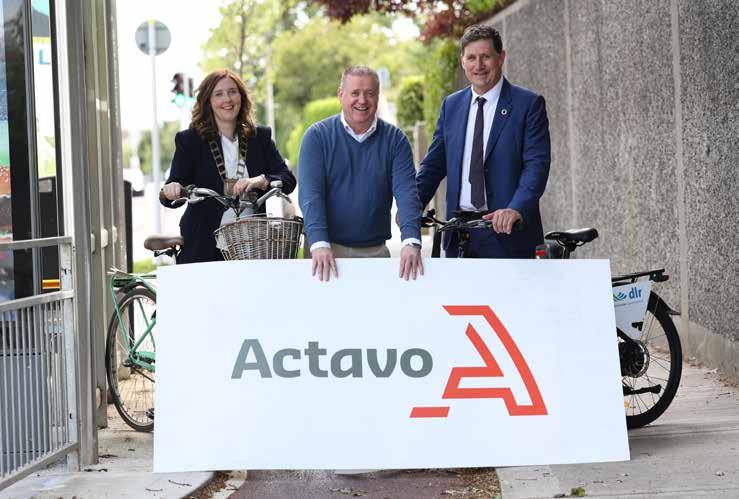
(L:R) Councillor Eva Dowling, Leas-Chathaoirleach of Dún Laoghaire-Rathdown County Council; Ollie Raftery, Head of Civils, Actavo Ireland and Eamon Ryan T.D., Minister for Transport, Environment, Climate and Communications.
Actavo completes Clonskeagh Road Pedestrian and Cycle Improvement Scheme
The Clonskeagh Road Pedestrian and Cycle Improvement Scheme from UCD to Clonskeagh Bridge was officially opened by the Minister for Transport, Environment, Climate and Communications, Eamon Ryan TD on 6th of June. Actavo Civils Division was contracted to complete the project for Dún Laoghaire-Rathdown County Council.
Actavo Civils Division has successfully delivered a high-quality and safe installation of a new cycle and pedestrian route. As part of the project, the team constructed cycle lanes, footpaths, and junction switchovers on Clonskeagh Road from the junction with Roebuck Road to the junction with Beech Hill Road. The project is part of the Sandyford to the City Centre cycle route.
Works undertaken as part of this project included: resurfacing of Clonskeagh Road, an upgrade of the junctions, application of anti-skid surfacing and line marking, landscaping and the completion of the drainage works.
Ollie Raftery, Head of Civils, Actavo Ireland, said: “Actavo Civils is pleased to have been selected for the completion of the Clonskeagh Road Pedestrian & Cycle Improvement Scheme Project by the Dún Laoghaire-Rathdown County Council. Our team is committed to delivering high-quality infrastructure solutions that positively impact our community and contribute to the enhancement of urban spaces. We are eager to contribute to future projects for the Greater Dublin Area Cycle Network Plan.”
Actavo has a proven track record of successfully delivering complex engineering projects, and recently secured the inaugural ‘Civil Construction Project of the Year’ award for its project ‘Rock Road Sustainable Transport Scheme’ at the Irish Construction Industry Awards 2023. The Clonskeagh Road Pedestrian and Cycle Improvement Scheme initiative underscores its expertise and continued commitment to excellence in urban development.
The project was completed by Actavo Civils Division after a previous contractor filed for liquidation in 2023.
8 MAGPLY COLLABORATION
www.civilandconstruction.ie 8 NEWS
We cannot expect one without the other.

It’s why we pride ourselves in focusing on how we, as a team, can always improve. It means embracing new technologies, continuous professional development, reviewing projects for fresh insights and building close relationships with our supply chain. After all, to build smarter, we need everyone to go further.
Go Further | Build Smarter
To learn more about how John Paul Construction can help you, email info@johnpaul.ie or visit www.johnpaul.ie
ABM Wins Three Kimberly-Clark Professional Golden Service Awards
ABM, the leading provider of integrated facility and aviation services, took home three prestigious Kimberly-Clark Professional Golden Service Awards. The ceremony took place at the London Hilton Hotel on Thursday, 23rd of May.
The Kimberly-Clark Awards have been running for over thirty years and recognise excellence and the achievement of the highest standards in the integrated facility services and cleaning industry across Ireland and the UK.
ABM was successful in the following categories:
• Retail (Under 100,000 square metres) – Dundrum Town Centre
• Cleaning Team of the Year – ABM Industrial Team
• Cleaning Operative of the Year – Aleksandar Cmrlec, Dundrum Town Centre
The company’s success at these key industry awards highlights its exceptional ability to deliver a wide range of essential services in large and complex facilities, such as universities, airports, hospitals, data centres, manufacturing plants, distribution centres and entertainment venues.
Ian Anderson, Managing Director, ABM Ireland, said: “These awards are a real testament to our ABM team members and the brilliant work they consistently deliver on a daily basis. It is always a great honour to receive recognition from our peers in the industry, particularly from the Kimberly-Clark Professional Golden Service Awards,
which are very highly regarded and competitive. These awards reflect our ongoing commitment to excellence, innovation and sustainability in all aspects of our operations. I extend my gratitude to our employees, clients and partners for their unwavering support, which has played a pivotal role in achieving this recognition.”
Don Nugent, Senior General Manager, Dundrum Town Centre, said: “This tremendous achievement is a testament to the hard work and commitment that is displayed every day by the cleaning team at Dundrum Town Centre. Judges at the Golden Services Awards were particularly impressed by the strong sense of collaboration between the cleaning team and other contract partners at Dundrum Town Centre, including security, maintenance and the waste management teams.”
ABM specialises in providing customised facilities solutions to clients in the healthcare, manufacturing, aviation, commercial, critical, retail & leisure, life sciences, transportation and logistics sectors.
The company has over 2,300 employees across Ireland with clients including Blanchardstown Centre, St James’s Hospital, Dublin Bus, Dublin Airport, The Mater Hospital, Golden Island Shopping Centre, University Hospital Waterford, Google, Brown Thomas Dublin, Tallaght University Hospital and Stephen’s Green Shopping Centre.

www.civilandconstruction.ie 10 NEWS
(L:R) Comedian and Host, Hugh Dennis; Cleaning Operative of the Year Aleksandar Cmrlec, ABM Dundrum Town Centre; Darren Broad from Nationwide Hygiene Group



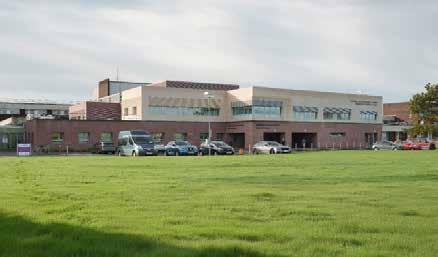





Cork | Dublin | Limerick www.visioncontracting.ie info@visioncontracting.ie
Main Contractor | Design & Build | CSA Contractor | Fit-Out
Elm Park Green Apartments, South Dublin
Sally Gap Bar, Powescourt Hotel, Wicklow
Coleman Court Student Accommodation, Cork University Hospital Kerry, Tralee, Co. Kerry
Collen Establishes New Executive Management Team
Collen, one of Ireland’s leading construction companies, has established a new Executive Management Team consisting of eight executives who will oversee the strategic direction of the business to facilitate growth both in Ireland and internationally. Last June, Collen appointed its first ever CEO, Kara Stuart, who will lead the new executive management team. The business has experienced year-on-year growth for several years and in 2023, Collen recorded a significant increase in turnover from €450 million to €650 million.
The business will focus on a number of strategic priorities including its work with Data Centre Service Providers and the energy sector, both of which are forecast as growth markets. Expansion of its Irish operations will continue, building on their substantial and diverse projects across the country. Further growth is expected in the Nordics region where Collen has operations in several Scandinavian countries.
A key element of the firm’s strategy will be its continued expansion in Ireland where it works with clients across a diverse range of sectors including commercial, fit out, data centres, power infrastructure, life sciences, industrial, residential, healthcare and education. Its operations in Ireland will be spearheaded by its recently appointed Managing Director for Ireland and the UK, Derek O’Connor.
The new executive management team consists of their CEO Kara Stuart, Leslie FitzPatrick (Chief Financial Officer), Gráinne Dowling (Chief People Officer) Padraic Regan (Group Commercial Director), Declan Callan (Director of Legal and Compliance), David Barron (Technical Director), Thomas O’Connor (Managing Director, Sweden) and Derek O’ Connor (Managing Director, Ireland & UK)
Kara Stuart, CEO of Collen said “The establishment of our Executive Management Team marks an exciting new chapter in the rich history of Collen. We plan to continue to build upon our substantial growth to date by focussing on key areas including our work with Data Centre Service Providers and in the energy sector. While we have experienced significant growth in international markets, we believe our operations in the Irish market will be a key growth area and a strategic priority for our business. I believe our new Executive Management Team strengthens the executive structure to better support levels of growth and the business will benefit significantly from their expertise and experience.
The business has been in the Collen family for eight generations and over 210 years. During that time it has completed a number of iconic projects including the RDS, Croke Park, Fitzwilton House, Dublin Port and Inishthrahull Lighthouse. In more recent times, Collen’s projects include The Freight Building/Premier Inn, 1 & 2 South County Leopardstown and Haymarket Smithfield.

www.civilandconstruction.ie 12 NEWS
(L:R) Collen’s new Executive Management Team - Declan Callan (Director of Legal and Compliance), Padraic Regan (Group Commercial Director), Gráinne Dowling (Chief People Officer), Leslie Fitzpatrick (Chief Financial Officer), Kara Stuart (CEO), Derek O’Connor (Managing Director Ireland & UK), David Barron (Technical Director), Thomas O’Connor (Managing Director, Sweden). Image Credit: Robbie Reynolds
EVERY DAY IS AN ADVENTURE
We delivered a 60MW data centre in the Netherlands faster than any similar sized data centre in the World
Working in extreme heat environments reaching temperatures of +40
Working on offshore oil rigs prone to 100 mph winds and 80 ft wave surges
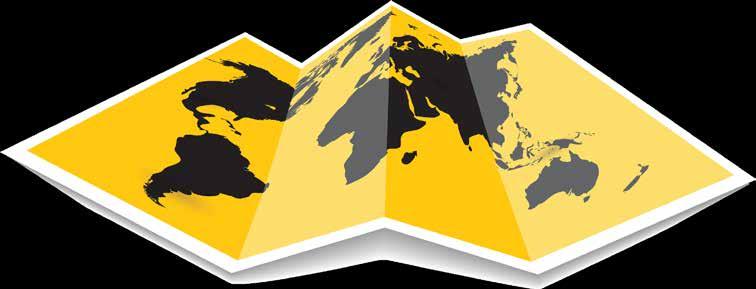
When you map out your day does it include working with the worlds leading multinational companies delivering cutting edge life science facilities to improve global health or state of the art data centres that revolutionise digital working?
Is it time for a new adventure? You’ll find it at joneseng.com/careers
Turnover and Employment Continue To Rise in Construction: CIF Construction Outlook Q2 Survey
Turnover and employment continue to rise in construction: CIF Construction Outlook Q2 Survey. Survey finds that almost half of companies not undertaking public works projects due to low margins and bureaucracy
Turnover and employment continue to rise in the construction sector according to the Construction Industry Federation Q2 Construction Outlook Survey, released today.
26% of companies acknowledged an increase in turnover year on year in Q1 with 34% expecting turnover to continue to increase in Q2. 20% of respondents reported an increase in the total number of people they employ, with 23% expecting the trend to persist into Q2.
The survey also found that 48% of construction companies had no involvement in public works projects citing low margins (15%), too much bureaucracy (13%) and lowest price award criteria (12%) as the three biggest deterrents. Another factor was a lack of a mechanism for engagement pre-tender to mitigate risk.
Cost increases continue to impact the sector with 68% reporting a year-on-year increase in the cost of raw materials and 60% anticipating the trend to continue in the next three months. 65% experienced a year-on-year increase in the cost of labour, with 50% expecting the trend to continue. Access to skilled labour (74%), securing a healthy profit margin (62%) and the increased cost of raw materials (62%) remain the three most prevalent challenges facing the construction industry heading into Q2.
Hubert Fitzpatrick, Director General of the Construction Industry Federation said:
“These latest findings illustrate that the health and agility of the construction sector is being maintained with continued growth across turnover and employment.
“Following the announcement of a €13 billion investment in public capital projects planned in 2024, and new legislation recently published providing for the establishment of the Future Ireland Fund and the Infrastructure, Climate and Nature Fund, the construction industry is hopeful that the investment momentum in critical infrastructure will overcome the current challenges to delivery.
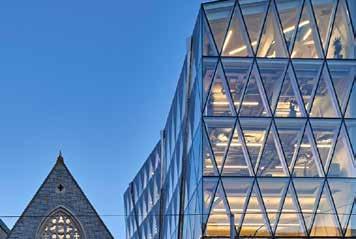
“As with many business sectors, attracting new entrants to the workforce is a challenge in the current labour environment. The industry is confident that it can respond to market needs and its workforce is growing. Between 2019 and 2022, during the Covid pandemic, the numbers employed in construction grew by 20,000 people. More and more people are realising the attractiveness of working in a sector with a rising demand and we expect this to continue as positive policy and sector recruitment initiatives are rolled out. The industry is working closely with Government on its careers action plan to seek new entrants and we’re looking forward to working with the new Minister to continue the good work previously done by the new Taoiseach.”
The survey of 250 construction companies carried out between 2nd to 10th April found that:
• 26% acknowledge an increase in turnover year-onyear in Q1, with 34% expecting turnover to continue to increase in Q2.
• 20% report an increase in the total number of people they employ, with 23% expecting the trend to persist in Q2.
• 65% experienced a year-on-year increase in the cost of labour with 50% expecting the trend to continue.
• 68% report a year-on-year increase in the cost of raw materials with 60% anticipating the trend to continue in the next three months.
• Increasing costs continue to impact the pricing of projects with 54% acknowledging a year-on-year increase and 44% expecting continued increases in Q2.
• Access to skilled labour (74%), securing a healthy profit margin (62%) and the increased cost of raw materials (62%) remain the three most prevalent challenges facing the construction industry.
• 48% of all companies had no involvement in public works contracts in Q1 with 44% having no planned involvement in Q2.
www.civilandconstruction.ie
14 NEWS
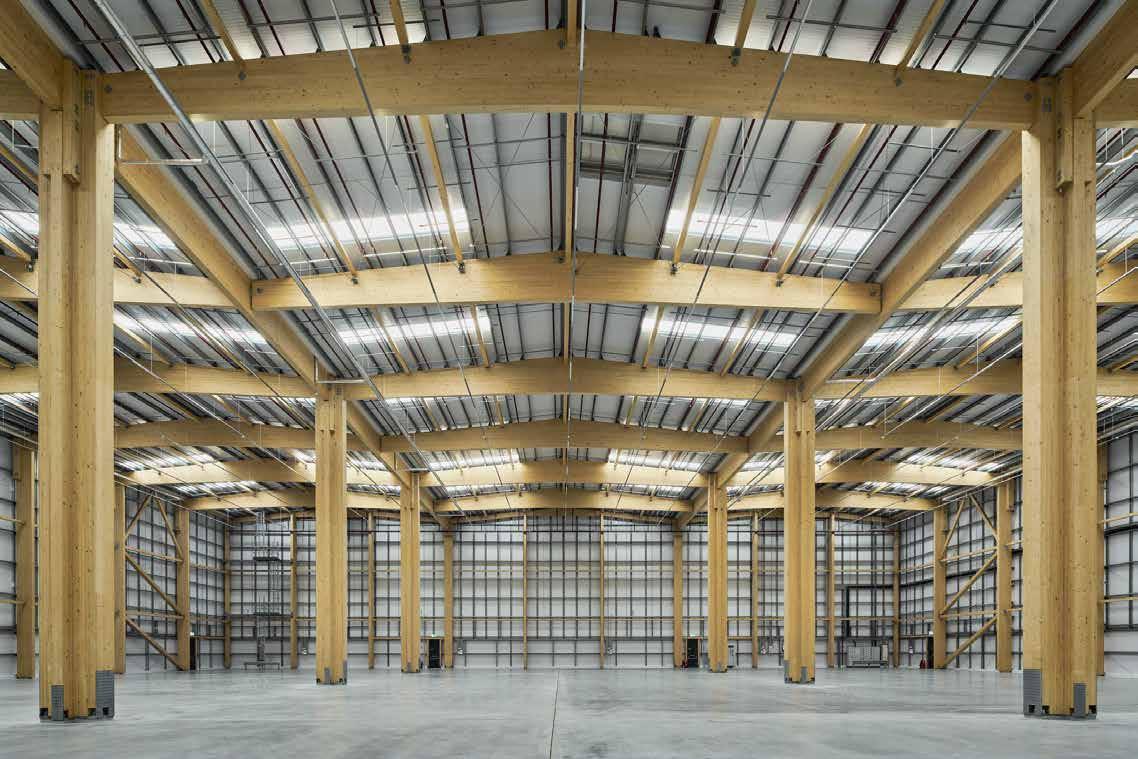
Ireland • United Kingdom • Germany • Netherlands Contact us today on 071 962 0378 to find out how we can help deliver your project. Award-winning Mechanical & Electrical Contractors with over 45 years’ of delivering excellence. www.kingmoffatt.com
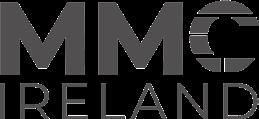
MEET THE FOUNDERSDECLAN WALLACE AND ARTHUR O’BRIEN

On the eve of the MMC Ireland National Conference 2024, we meet the co-founders who started a movement that brings together close to 90 of Ireland and the UK’s most recognisable construction brands.
Over the next 72 hours, up to 400 Irish and international leaders and learners of offsite and other modern methods of construction will come together in the Lyrath Estate in Kilkenny. With delivery of the built environment challenged to address global challenges of digitalisation and decarbonisation, industry pioneers Declan Wallace, CEO of Evolusion Innovation, and Arthur O’Brien, Managing Director of C+W O’Brien Architects, are on a mission. As co-founders of MMC Ireland, the industry body representing companies involved in
the procurement, design and delivery of MMC, they understand the power and potential of bringing such deep knowledge and project expertise together to drive MMC adoption.
Visionary Leadership and Industry Insight
Declan Wallace, the current Chair of the MMC Ireland Board, emphasises the need for collaboration within the MMC sector:
“We needed to bring the MMC sector together, to have them work together and share information as much as possible.”
The Board Chair highlights the misconception around the secretive nature of MMC, clarifying that while the
16 MMC IRELAND
www.civilandconstruction.ie

ONE SOLUTION, ONE SUPPLIER
We provide an all-encompassing, customized service to ensure your system installation is hassle-free — adding value, not stress. With PIPELIFE, you collaborate with one supplier from conception and layout design through to installation. Whether you’re starting from scratch or planning to retrofit, we’ll find the optimal solution for your individual project requirements, saving you time and money every step of the way.
Our Reputation – Your peace of mind Discover our full service portfolio online www.pipelife.ie www.pipelife.ie
business model remains the key challenge, the essence lies in standardising systems and ensuring they are designed, manufactured, and delivered correctly. He observes that the industry’s complexity demands a collaborative approach to streamline processes and ensure both project viability and company profitability. Decan identifies the mispricing of MMC projects as a significant hurdle, noting that understanding the intricacies of MMC can lead to more accurate cost assessments and quicker project delivery compared to traditional methods.
“In terms of cost, MMC is roughly the same price as traditional methods, but the big opportunity is that you can deliver quicker,” he explains.
The rapid project turnaround allows developers to commence subsequent projects sooner, enhancing overall profitability. The robust project expertise and capacity to scale are vital assets of the Irish sector, according to Declan. However, he stresses the need for a sustainable, buildable pipeline to ensure market growth—a central objective of MMC Ireland.
“We set up MMC Ireland to grow the industry and we believe that this can be best achieved by working together,” he asserts.
The organisation’s collaborative ethos aims to contribute to a more sustainable industry, leveraging Ireland’s unique position to shape policy and address systemic blockages to delivery.
Global Perspectives and Local Impact
Arthur O’Brien, who brings his extensive Irish and international experience to MMC projects, is committed to advancing the sector in Ireland and for Irish companies internationally. Arthur’s work outside Ireland, particularly on large-scale projects, has equipped him and his C+W O’Brien team with invaluable insights into the industrialisation of construction.
“Our approach to large-scale projects, especially in challenging environments, has been to embrace the industrialisation of construction,” he says, highlighting the benefits of international learning curves for domestic projects.
The MMC champion emphasises the importance of every team member’s role in the construction process, advocating for an inclusive approach where each individual’s contribution is valued. This philosophy, he believes, is crucial in modernising construction and manufacturing processes for the 21st century.
“From the young person tidying up the site to the head architect, every role is crucial,” he affirms.
Arthur shares his optimism for the growth of an MMCready pipeline of projects for Ireland, pointing to the
momentum and collaborative spirit of the members driving MMC Ireland forward.
Collaborating Construction Innovation
Together, Declan and Arthur’s leadership has steered MMC Ireland towards becoming a formidable force in the industry, not just in Ireland, but globally. The organisation now brings together close to 90 member companies, all of whom share the founders commitment to transforming construction practices in Ireland. Their vision is supported by a practical strategy to grow the marketplace that includes capturing and sharing sectoral knowledge, establishing best practice, contributing to government policy, and promoting transparent procurement processes.
The MMC Ireland members’ board features representation from each of the seven categories of MMC, including Chair Declan Wallace, Evolusion Innovation; Pat Kirwan, C+W O’Brien Architects; Tony McLoughlin, Glenveagh Properties plc; Sarah-Jane Pisciotti, John Sisk & Son; Eoin Waldron, Castle Modular; Ger Fahey, Horizon Offsite Ltd; Richard Walsh, O’Dwyer Steel; and Kevin Loftus, Cairn Homes plc.
Paul Tierney, CEO of MMC Ireland, encapsulates the organisation’s mission succinctly:
“On one hand we have a government that is open to learning and willing to engage with industry; and on the other we have a technically brilliant MMC sector that has the capability and capacity to scale delivery. Our role within MMC Ireland is to cut out the noise and waste between the two.”
MMC Ireland’s proactive approach is reflected in its various working groups dedicated to technical guidance, national policy support, and awareness and education. These initiatives aim to align government policies with industry capabilities, ensuring a coherent strategy for MMC adoption and growth.
Looking Ahead
As MMC Ireland continues to expand its influence, the focus remains on growing the sector and creating a sustainable and innovative construction environment. While Declan and Arthur, together with their teams at Evolusion Innovation and C+W O’Brien Architects, kicked off this MMC movement in Ireland, they are clear that it is the combined expertise and visionary leadership of the growing membership that will be instrumental in navigating the challenges and opportunities that lie ahead.
Their combined efforts not only promise to revolutionise the Irish construction sector but also position Ireland as a centre of excellence for MMC in Europe.
For more information on MMC Ireland and its initiatives, visit www.mmcireland.ie.
18 MMC IRELAND www.civilandconstruction.ie
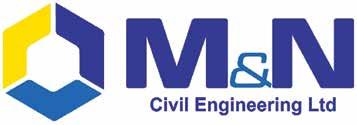
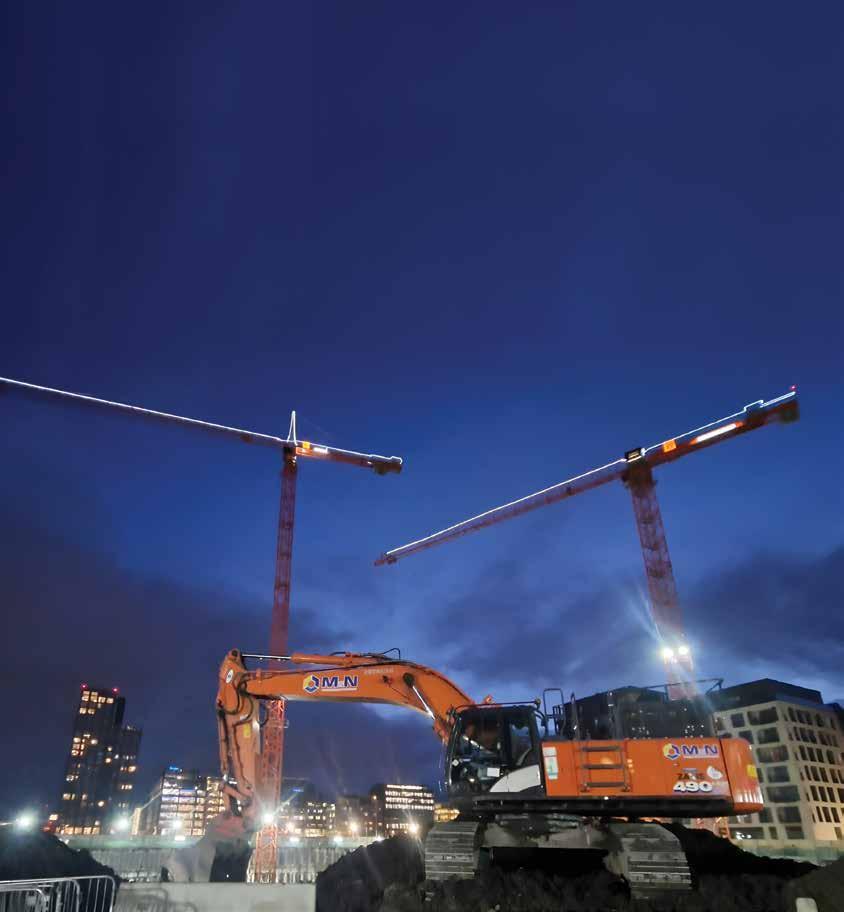
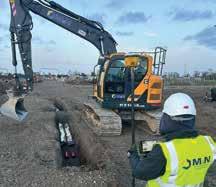


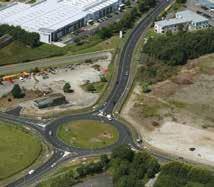
SHAPING OUR FUTURE CIVIL ENGINEERING SOIL STABLISATION BASEMENT EXCAVATIONS ROAD INFRASTRUCTURE www.mandncivils.com
61 HOMES IN RATHDRUM, COUNTY WICKLOW, HAVE BEEN EQUIPPED WITH 6KW GRANT AERONA³ R32 AIR SOURCE HEAT PUMPS

Avondale Grange Development in Rathdrum, County Wicklow has recently incorporated the 6kW Grant Aerona³ R32 air source heat pump into each of its 61 residential homes as part of a customised integrated heating package. The in-house technical specialists at Grant collaborated closely with Woodfort Group and Total Energy Plumbing & Heating Ltd to tailor the heating solution for each home, with all equipment provided by SKC Providers based in Rathnew.
Barry Gorman, National Renewables Sales Manager at Grant, explained the team’s involvement in the expansive housing project, stating, “Being selected by the Woodfort Group to provide a sustainable heating solution for their latest development underscores the trust they have in our advanced renewable heating technologies. For the Avondale Grange Development, our technical team assessed plans and recommended the Grant Aerona³ R32 heat pump, in conjunction with Grant Integrated Unit for hot water storage, ensuring each home receives an exceptionally efficient heating and hot water system.”
For a greener and more eco-friendly heating solution, a 6kW Grant Aerona³ R32 air-to-water heat pump was specified as the primary heating source. Renowned for its exceptional efficiency, the Grant Aerona³ range boasts an ErP rating of A+++, making it one of the market’s most environmentally friendly options. Its compact size

facilitates easy installation, while its ability to achieve high Seasonal Coefficient of Performance (SCOP) values ensures sustainability even at lower temperatures. Moreover, the Grant Aerona³ R32 heat pump series aids in meeting the compliance requirements of Part L of the building regulations.
Additionally, the installation featured a 210-liter Grant pre-plumbed hot water cylinder as part of the Grant Integrated Unit, ensuring round-the-clock hot water supply to the properties. Known for its rapid and efficient water heating capabilities, the Grant Integrated Unit surpasses standard cylinders in both installation ease and operational efficiency.
Grant’s technical team works with building developers, specifiers and engineers daily to design bespoke integrated heating systems for one off new-builds to multi-home developments. The Grant team will size and specify individual heating systems free of charge, to ensure each property’s heating system performs to its optimum efficiency.
Visit www.grant.ie for more information on Grant’s range of innovative heating solutions. Follow Grant on Facebook and Twitter @GrantIRL, Instagram @grant_irl or on LinkedIn @GrantEngineeringULC Think Heating. Think Grant.
www.civilandconstruction.ie
20 GRANT
Avondale Grange Development in Rathdrum
6kW Grant Aerona³ R32 air source heat pump
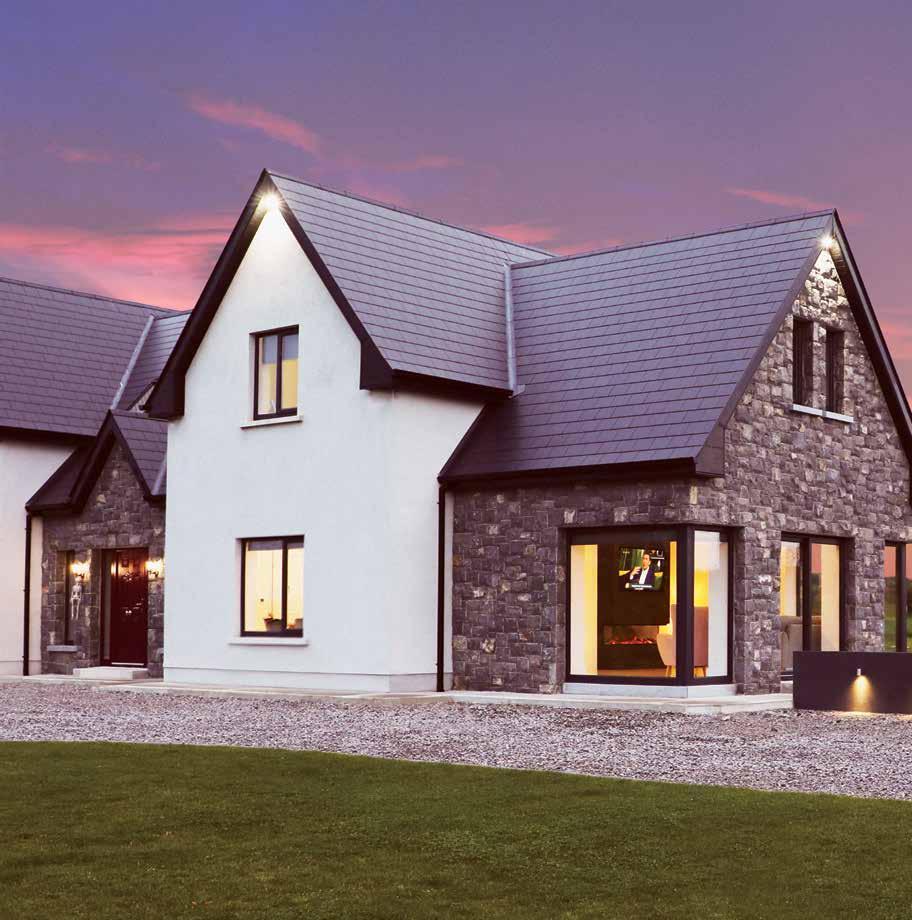
Our complete integrated heating packages provide everything needed to build a highly efficient, warm and comfortable home.
Tailored to suit the homeowners’requirements, each Grant heating package is correctly sized and specified, free of charge, to achieve compliance, maximise efficiencies and provide long-term savings.
Packages feature the Grant Aerona3 air to water, air source heat pump, Grant hot water cylinders, Grant Afinia aluminium radiators and the Grant Uflex underfloor heating system. Smart controls are also available.
Trust Grant on the journey to warmth and comfort by sending house plans to: heatpump@grant.ie


‘ESG INSIGHTS FOR THE CONSTRUCTION INDUSTRY’ EVENT DRAWS STRONG ATTENDANCE AT AVIVA STADIUM
Industry leaders and stakeholders gathered recently at the Aviva Stadium for Kilsarans ‘ESG Insights for the Construction Industry’ event. Hosted by Jonathan Healy, the event offered a deep dive into Environmental, Social, and Governance (ESG) practices within the construction sector.
Attendees heard presentations and a panel discussion from various industry experts, each contributing to the collective understanding of the importance of sustainable practices in construction.
Ken Mulkerrins, Head of Innovation & Sustainability at Kilsaran, outlined Kilsaran’s remarkable journey towards
ESG excellence. His presentation shed a light on the innovative approaches adopted by Kilsaran, including the launch of two new Electric Concrete trucks that are now part of the fleet in Dublin city centre.
Sinéad Hickey from John Sisk & Son Ltd shared insights into ESG strategies from the vantage point of a primary contractor. Sinead outlined Sisk’s sustainability journey and the company’s 2030 roadmap whilst highlighting the need for strong collaboration across the sector.
Brian O’Kennedy, CEO of Goodbody Clearstream gave invaluable guidance on navigating reporting regulations on ESG and what companies need to do to be prepared.
www.civilandconstruction.ie 22 ESG
L to R: David McKeown, Co-CEO of Kilsaran, Jonathan Healy, Host, Sinéad Hickey, Head of Sustainability at John Sisk & Son Ltd, Ken Mulkerrins, Head of Innovation & Sustainability at Kilsaran and Brian O’Kennedy CEO of Goodbody Clearstream.

David McKeown, Co-CEO of Kilsaran, reiterated the company’s unwavering commitment to ESG, citing recent investments in the Electric Concrete Trucks as well as the establishment of a dedicated Research & Innovation team. Looking to the future, David outlined Kilsarans focus on Materials Recovery & Recycling and the use of recycled aggregated in construction.
The event culminated in a lively panel discussion with
great interaction from the audience. A resounding success, the event left attendees enlightened and informed on the importance of ESG and the need for collaboration across the sector to make meaningful change in the construction industry.
For more information on Kilsarans ESG journey visit www.kilsaran.ie
23 www.civilandconstruction.ie
Kilsarans new Electric Concrete truck that is now part of their Dublin City Centre fleet.


IRELAND’S HOUSING CRISIS: RISING CONSTRUCTION COSTS AND APRIL SURGE IN NEW UNITS
Ireland’s construction sector, crucial for economic growth and societal well-being, faces significant challenges that directly impact the nation’s housing crisis. The escalating costs of construction materials, a phenomenon felt globally, have particularly severe ramifications in Ireland’s market, characterised by high demand and insufficient supply. This detailed analysis delves into the dynamics behind these rising costs and their effects on the housing sector by integrating recent planning application data to provide a comprehensive view of how these factors interact within the broader landscape of Ireland’s housing market. Understanding these dynamics is essential, as the availability and affordability of housing are critical indicators of a country’s economic health and social stability.
Global Supply Chain Disruptions and Material Costs
The COVID-19 pandemic has profoundly disrupted global supply chains, affecting the cost of essential construction materials worldwide. Ireland, like many other countries, has experienced significant effects, particularly in the availability and pricing of key materials such as timber, concrete, and steel. These disruptions have led to notable delays in material deliveries and substantial price increases, exacerbating the challenges in the construction industry.
Timber
Timber, a critical material in residential construction, has experienced dramatic price fluctuations. A surge in DIY projects during the pandemic, coupled with an increase in construction activity, post lockdown, drove demand to
24 CONSTRUCTION INFORMATION SERVICES
www.civilandconstruction.ie
unprecedented levels. Supply constraints due to lockdowns and reduced production capacity have sharply increased timber prices. Ireland’s reliance on imports, particularly from countries like Canada and Sweden—where external factors such as forest fires and environmental policies impact timber supply—further exacerbates the situation.
Concrete and Cement
Concrete and cement prices have surged due to the energy-intensive nature of cement production and global energy price increases. Environmental regulations aimed at reducing carbon emissions have led to higher costs for manufacturers, which are often passed on to consumers. In Ireland, where construction activity remains robust, the demand for concrete has outstripped local supply capabilities, pushing prices upward.
Steel
Steel, essential for structural frameworks and reinforcing, has seen its prices soar due to a combination of factors. Increased global demand, particularly from China, and reduced production during the pandemic’s initial phases have led to soaring costs. Geopolitical tensions and trade policies affecting major steel-producing countries have introduced significant volatility and uncertainty into the market.
Planning Applications and Construction Impacts
CIS housing data for the past 2 years indicates some interesting trends within the residential sector. Figures derived from the CIS Insights tool shows that in 2022 over 1,700 residential planning applications (ex. Self-build) were lodged for planning, compared to 1,400 applications lodged in 2023. These submissions accounted for 90k units in 2022 compared to 47k units lodged for planning in 2023. The volumes of residential planning
applications approved planning in both 2022 and 2023 were similar, both in and around the one thousand marks. However, the volume of residential units approved planning in 2022 was just under 42k units, compared to just under 50k units in 2023. On site activity in 2022 showed that a total of 680 residential projects commenced on site in 2022 compared to 787 projects started in 2023. The volume of residential units started in 2022 was 25.5k units, compared to just under 30k units in 2023. 2024, has started off slowly, with significantly lower volume of units and projects being applied for and approved, but commencement activity so far in 2024 has seen a massive surge.
Economic Implications
The rising cost of construction materials and the resulting delays in project commencements exacerbate the housing shortage, inflating prices and making affordable housing increasingly out of reach. Delays not only affect housing availability but also have broader economic implications. Construction projects are significant drivers of employment and economic activity. When projects are delayed, it can lead to job losses and reduced economic growth, impacting various sectors beyond construction. Moreover, the uncertainty in the construction sector can deter investment, both domestic and foreign. Investors seeking stability and predictable returns may look elsewhere, depriving the Irish economy of much-needed capital for housing and infrastructure projects. However, there has been some recent positive news. CIS data showed that over 18.5k residential units started in the month of April this year, up 600% from the previous period in 2023. This would suggest that there will be a surge of houses delivered in the next 18 months.
Addressing the Challenges
To mitigate these issues, a multi-faceted approach is

25

necessary. This could involve diversifying supply sources to reduce dependency on imports, investing in local production capacities for critical materials, and exploring alternative materials and construction methods that are less resource intensive. Government interventions such as subsidies for essential materials or support for the development of sustainable local industries could also play a crucial role in stabilizing material costs and ensuring the timely completion of construction projects.
Conclusion
The complex relationship between construction material costs and Ireland’s housing crisis forms a multifaceted challenge that demands a strategic, comprehensive response. This analysis, supplemented by recent planning application data, underscores the need for proactive government measures to stabilize material costs and ensure the timely completion of construction projects. By integrating policy measures, market adaptations, and collaborative stakeholder engagement, Ireland can progress toward a more stable and affordable housing market. This
path forward will require innovation, cooperation, and a commitment to addressing both the economic and environmental implications of construction and housing development. The state of the housing market in Ireland is intricately linked to global economic forces, local industry capabilities, and policy decisions, necessitating not just adaptation to changing market conditions but proactive measures to ensure sustainable growth of the construction sector and the availability of affordable housing for all. However, there has been some recent positive news. CIS data showed that over 18.5k residential units started in the month of April this year, up 600% from the previous period in 2023. This would suggest that there will be a surge of houses delivered in the next 18 months.
If you would like a free demo of our lead generation platform or to learn more about the depth of our data, please arrange a demo by calling +353 1 2999 200, email sales@ cisireland.com
Written by Adam Dargan, CIS Research Executive
www.civilandconstruction.ie 26 CONSTRUCTION INFORMATION SERVICES


RECREATING LEADERSHIP DCON Safety Consultants are and independently owned Built Environmental Safety, Health & Wellbeing Consultancy www.dconsafety.com

BUILDING A SUSTAINABLE FUTURE: THE ROLE OF BUILD DIGITAL IN ENABLING DIGITAL CONSTRUCTION ADOPTION IN IRELAND
In the ever-evolving landscape of the construction industry, embracing digital transformation has become more than just a trend; it’s a necessity for sustainability, efficiency, and innovation. Build Digital is an initiative aimed at revolutionising the sector by promoting world-class digital practices. “
What is Build Digital?
At its core, Build Digital envisions a construction sector where digital tools, standards, and approaches are seamlessly integrated into every facet of the industry and its supply chain. The overarching goal is to create a more sustainable and innovative environment, fostering efficiency and competitiveness on a global scale. To achieve this ambitious vision, Build Digital focuses on providing guidance, leadership, and essential resources to equip stakeholders with the necessary digital skills and knowledge.
Looking ahead, Robert Moore, Build Digital Project Lead said: “Build Digital is the vehicle that will enable Ireland’s construction industry to adopt digital construction so that it achieves the goals of the Irish BIM mandate,”
Empowering Build Digital through Collaboration
Central to the success of Build Digital is its collaborative approach, bringing together academia, government agencies, and industry to drive digital adoption across the construction sector. Led by Technological University Dublin (TU Dublin) with partners Atlantic Technological University, Munster Technological University, South East Technological University, and University College Dublin, Build Digital harnesses unmatched expertise and regional reach to effect meaningful change.
A recent strategic collaboration with the Grangegorman Development Agency (GDA) marks a significant milestone for Build Digital, further strengthening ties between industry, government, and academia. By integrating project operations within the GDA’s special projects function, Build Digital expands its capacity to deliver innovative digital approaches and tools, ultimately transforming the construction industry landscape.
How Build Digital is preparing the industry for the Capital Works Management Framework (CWMF) BIM requirements (Irish BIM Mandate)
As of January 2024, the Irish government mandated BIM
28 SUSTAINABILITY
www.civilandconstruction.ie

on a phased basis in public works contracts through the Capital Works Management Framework (CWMF). The following standards are now applied to public works projects over €100 million:
• ISO 19650: The ISO 19650 series provides guidelines for the organization and management of information about construction projects using BIM, ensuring consistency, efficiency, and interoperability across various stakeholders involved in the construction process. The series has been adopted into the CWMF on a phased basis to impose standards on information for project delivery across the public sector.
• Uniclass 2015: Uniclass 2015 is a classification system used in on construction industry to organize information about building projects. Uniclass 2015 is structured hierarchically, with categories ranging from broad divisions like ‘Activities’ and ‘Spaces’ down to more specific elements like ‘Products’ and ‘Systems’. This system helps in the classification of all aspects of a construction project, including design, construction, and operation, facilitating better coordination and collaboration among stakeholders.
• Industry Foundation Classes (IFC): Industry Foundation Classes (IFC) are a standardised data schema used in the construction industry for sharing and exchanging information between different software applications. The schema is developed and maintained by buildingSMART International, an industry consortium focused on improving the interoperability of BIM software and workflows.
• International Cost Management Standard (ICMS): The International Cost Management Standard (ICMS) is a globally recognised framework for standardising cost management practices in construction and infrastructure projects. The standard covers cost and carbon management aspects, including cost
classification, measurement principles, and reporting formats.
The Irish government mandated BIM underscores the importance of embracing digital practices to enhance project delivery and outcomes. The adoption of BIM is expected to drive efficiency in terms of time, cost and quality outcomes. It is also vital for accurately measuring the embodied carbon of construction projects, which is essential for meeting challenging climate action plan targets, increasing productivity and reducing waste.
Build Digital plays a crucial role in supporting the industry through this transition by releasing a series of templates and guides tailored to meet these BIM Mandate requirements. These resources, including Information Management Plans and BIM Implementation Guides, provide comprehensive frameworks for stakeholders to navigate the complexities of BIM adoption effectively. By aligning with international standards such as ISO 19650 series Build Digital ensures that Irish construction practices remain at the forefront of digital innovation.
How else can Build Digital support the construction industry?
Build Digital offers a wealth of resources to support stakeholders in their digital transformation journey. From process workflows that map ISO 19650 activities into the CWMF work stages to a diverse range of templates addressing information management plans, Build Digital provides practical tools to streamline digital adoption. These resources are complemented by insightful guides covering fundamentals, ISO standards, and implementation strategies, ensuring stakeholders have access to the knowledge needed for successful digital transformation.
29 www.civilandconstruction.ie
Insights into digital transformation trends
The insights from Build Digital’s recent reports are invaluable for the construction industry. Recent reports published on the Build Digital website provide insights into the current state of digital transformation within the construction industry, both nationally and internationally. These reports highlight key challenges, opportunities, and best practices for stakeholders navigating the digital landscape. From studies showcasing successful digital implementation to in-depth analyses of industry trends, these reports serve as essential resources for organisations seeking to drive digital innovation.
Access to Essential Tools and Inventories
Through its Exchange Hub area, Build Digital allows industry access to essential tools, inventories, and support networks. Whether it’s BIM templates, inventories of networks, education and training resources, or circular economy networks, Build Digital’s Exchange Hub serves as a centralised platform for accessing critical resources and fostering collaboration within the industry.
The templates, guides, and other tools are available on Build Digital’s Exchange Hub area at www.builddigitalproject.ie/
A Priority for Ireland’s Future
As a priority action under the Government’s Project Ireland 2040, Build Digital plays a pivotal role in enabling increased innovation within the Irish construction sector. By fostering collaboration, driving digital adoption, and empowering stakeholders, Build Digital paves the way for a sustainable and competitive future.
Build Digital stands as a beacon of change in Ireland’s construction industry, championing digital transformation to create a more efficient, sustainable, and innovative sector. With its unwavering commitment to collaboration, accessibility, and excellence, Build Digital continues to lead the charge towards a digital-driven future for construction in Ireland and beyond.

30 SUSTAINABILITY www.civilandconstruction.ie

Make long-term savings with an energy efficiency upgrade
https://www.energia.ie/cash-for-kilowatts to find out more
Visit
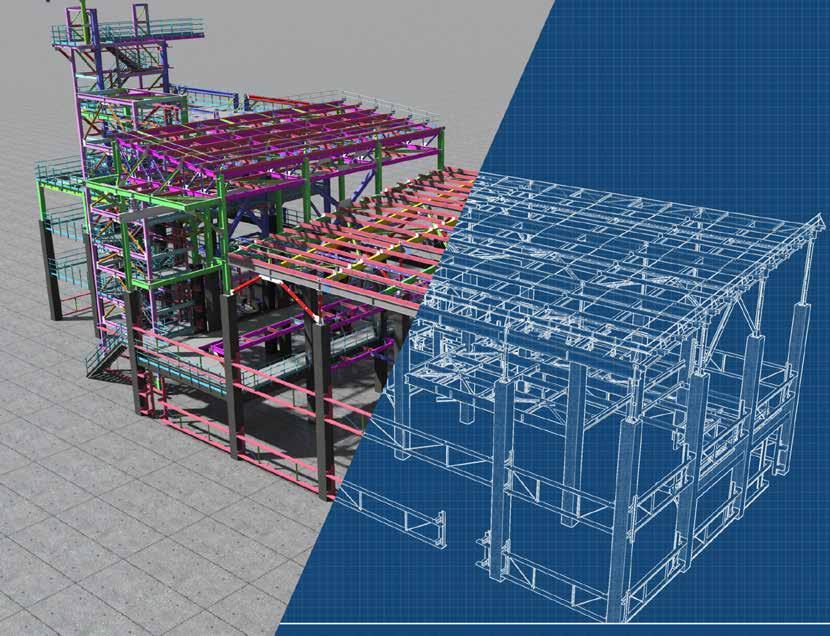
THE TRUE ADOPTION OF BIM - ADDING TANGIBLE PROJECT VALUE
It is fair to say that BIM has been a topic of great interest within the construction industry over the last number of years, hailed as one of the core ways that we as an industry are embracing technological evolution, tackling inefficiencies, improving information quality and increasing design team collaboration. It is true that it offers a number of distinct advantages, and yet, as noted by John Hainsworth of Aurecon in his article, ‘The promise of ‘digital’ won’t be achieved by doing things the way we’ve always done things’, with an array of definitions and a lack of clarity surrounding BIM, its full benefits are yet to be realized. John points to the fact that its implementation is often carried out in a file-based, transactional manner, with a truly collaborative approach absent
and ways of working essentially the same as they have been traditionally – just using the technology to do the same things and missing out on the potential benefits.
At Linesight, the lack of willingness to fully adopt is something that we see on a global basis, although the extent does vary somewhat from region to region. We have adopted BIM on a global basis and invested heavily in its implementation, both in hardware and software, and in continuous staff training, to ensure that we are up to date with the latest developments and at the forefront in terms of its effective utilization. Below is a summary of the key benefits that we see in the effectual use of BIM:
32 TECHNOLOGY www.civilandconstruction.ie
Speed and agility
The pace at which estimations can be produced increases considerably with the use of BIM, and this is one of the key advantages of its effective implementation. It enables the creation of option costs with greater speed, as well as the potential for live cost planning and modelling – introducing a level of agility with cost planning and estimating that has not traditionally been possible. Ultimately, this leads to faster decision making and thus, a faster speed to market.
Accuracy and quality
Information accuracy and quality has been a particular challenge for the industry in recent years, with the UK’s Get It Right Initiative finding that information errors cost the industry an estimated 5% of project value globally. In addition to the abovementioned speed and agility benefits, effective BIM implementation increases the accuracy with which cost estimating, planning and modelling can be carried out, by minimizing the risk of human error, as well as supporting a higher quality of information. This in turn leads to a more cooperative project, as tenderers are much less likely to recover costs incurred due to poor or inconsistent information.
Increased connectivity
While increased collaboration is often touted as a key benefit associated with BIM, this is not something that comes to fruition as often as one may think. The technology facilitates clarity, transparency and real-time sharing of information across the project team, coordinating information from various disciplines and eliminating version control issues, as well as keeping the lines of communication open. However, a proactive approach is needed across the team to actually realize these benefits, which is quite often lacking.
Cashflow
Managing and forecasting cashflow throughout a project is fundamental to its success, and traditionally, cashflow analysis is a lengthy and tedious process. From Linesight’s perspective, this is one of the biggest advantages associated with BIM – its effective adoption BIM facilitates more accurate speed forecasting by linking cost-loaded models and programs, with more detailed models producing more accurate cashflow analyses. Ultimately, our early involvement in a project means that cash flow investment can often be deferred, which is particularly beneficial for projects with a large capital spend.
Cost intelligence
While benchmarking is not a new methodology, BIM facilitates it at a more accurate level as costs are broken down in more detail in the models, so by splitting the model, it allows us to benchmark specifics. However, by using BIM to its full potential, it pushes this further, to what we refer to as cost intelligence. With a deluge of complex data associated with projects nowadays, utilizing the latest data visualization tools brings this data to life in a meaningful way – illustrating trends and concepts in a quick and easy-to-digest format, allowing project teams and clients to draw conclusions from large volumes of data and inform effective decision-making.
In conclusion
While the benefits of BIM are often well-covered, these are not often realized to their full potential due to implementation or adoption issues. Ultimately, the technology is there, but not the willingness to take the leap of faith to truly adopt and trust the use of BIM. At Linesight, we believe that clients and design teams should consider this sooner rather than later, as the rewards are rich. We’ve made the jump and seen significant benefits in the built environment for our clients – are you ready for the leap?

www.civilandconstruction.ie 33
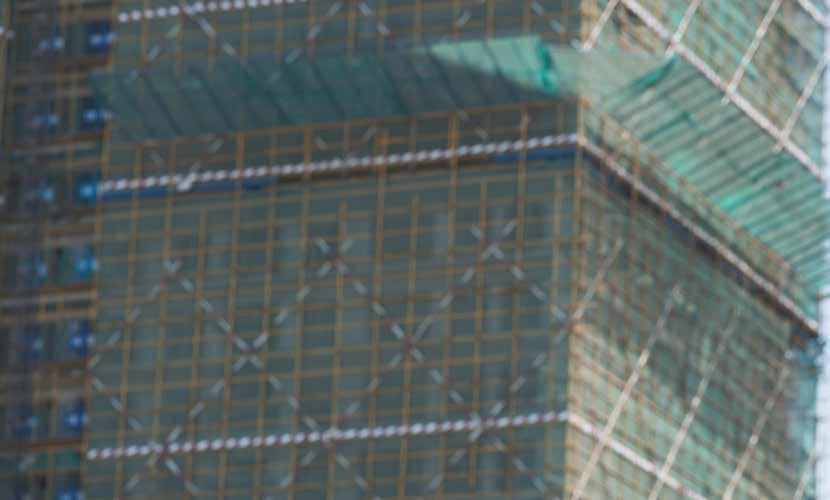
ACCENTUATING OUR HUMAN SKILLS IN THE DIGITAL AGE OF AI
We are living through a technological evolution (we always have, and we always will).
Everywhere you turn, people are talking about how AI (artificial intelligence) is going to replace us as humans. But that is not the case. AI should be seen as a useful tool to support and augment what we do. Rather than fearing technology, we should focus on accentuating what makes us unique as humans.
The World Economic Forum’s “Future of Jobs 2023 Report” lists the “Top 10 Skills Needed by 2027,” essential for navigating the complexities of the modern workplace and society. Diverse thinking skills are listed along other critical leadership qualities like resilience, flexibility, agility, motivation, self-awareness, empathy, active listening, curiosity, and lifelong learning are also emphasized. While technological literacy is included, it is overshadowed by these “soft skills” or uniquely human qualities.
These skills are not inherent gifts; they are taught, learned, and practiced. However, these critical skills are seldom taught at home, in school, university, or the workplace. The threat of AI technology is not that it will replace humans, but that it will replace work better su-
ited to machines, such as mundane, tedious, repetitive procedural tasks. This allows humans to focus on more valuable and uniquely human skills. Integrating AI with human skills creates new opportunities for productivity and competitiveness, underscoring the significance of intangible human assets like intellectual and human capital. Through this article, we aim to shift the focus onto these uniquely human skills, exploring how they can be cultivated and accentuated in the digital age of AI.
Connecting Human Qualities
Understanding how our unique human qualities connect and work together is essential to fully appreciating their importance in the digital age. Our consciousness of the past, present, and future, our ability to think and imagine, to create, and to interact and collaborate make us special. Thought, decision, and action are interconnected, with the quality of each step determining the outcome. Critical, analytical, and creative thinking provide the foundation for making informed decisions. Our ability to see things from different perspectives—from the bottom up as individual participants, or from the top down as part of an ecosystem—enables us to iterate and play through potential scenarios, assessing ethical outcomes before taking action. These are not binary or algorith-
34 AI
www.civilandconstruction.ie

mic calculations. A broader understanding of the context and ethical decision-making ensures actions align with moral and societal values. Volition, or the will to act autonomously, transforms decisions into actions. Courageous leadership guides and inspires others, while thinking of possible futures drives innovation and influences change. Empathy and relationship-building strengthen collaborations and community bonds. These interconnected qualities enable humans to navigate and shape the future, leveraging their unique capabilities in an AI-driven world. We should recognize, appreciate, and celebrate these qualities, rather than fear becoming obsolete to a tool designed by humans, for humans.
Leadership Skills
There is a crisis in leadership skills in the AEC sector. We were brought up in a culture and education system designed to produce followers, to service an industrial production process. Now that procedural tasks are being automated, we are left wondering what to do. Leadership skills are essential for navigating the challenges of integrating AI and other advanced technologies. Leadership is not the same as management. Management follows tasks, procedures, and rules. Leadership is visionary, inviting, inspiring, influential, authentic, dynamic, adaptable, agile, resilient, and balanced, ensuring that teams are motivated and aligned with a common mission.
Leadership in the digital age is about driving change, fostering innovation, and guiding teams through the complexities of a technologically advanced environment. Courageous and visionary leadership faces and confron-
ts the challenge of technological change, identifying opportunities and competitive advantages. True leaders inspire collaborators by communicating a clear purpose, setting market trends, and building a strong reputation that attracts top talent. They maintain empathetic human intimacy by building lasting relationships and fostering a harmonious and dynamic culture of mutual respect and shared responsibilities to drive change through effective innovations. Many in the AEC sector do not see themselves as potential leaders or find leadership development relevant to their roles, highlighting a significant gap in the industry’s attitude and approach to cultivating leaders. There may be many managers in AEC, but there is a shortage of true leaders.
Thinking Skills
Thinking skills are foundational to effective problem-solving and innovation, particularly in the AEC sector where we continuously face new and complex challenges. This requires a diverse set of thinking skills. Analytical thinking breaks down complex challenges into manageable parts to understand their individual components and functions, aggregating understanding to comprehend the whole system. Critical thinking evaluates information, challenges assumptions, and assesses the validity of ideas, fostering a habit of reflective scepticism to ensure robust problem definitions and solutions. Creative thinking uses imagination and ingenuity to recombine elements and generate innovative solutions or approaches, embracing divergent thinking and risk-taking to explore new possibilities. Design thinking focuses on user needs, experiences, and feedback to create empathetic, user-centric
35 www.civilandconstruction.ie
solutions through iterative cycles of prototyping, testing, and refining. Systems thinking understands how parts fit within the context of larger systems, recognizing interdependencies, and considering the impact of changes within the system. Again, these are skills that must be taught, learned, and practiced.
When was the last time you had a lesson in thinking skills at home, at school, in university, or in your workplace? Like leadership development training, most have been deprived of developing essential thinking skills. Intellectual curiosity, the generation of novel ideas and approaches, the willingness to experiment and try, and even embrace failure and try again—these are essential components of innovation. The iterative process of thinking is not binary or procedural; it emphasizes continuous improvement through feedback loops and iterative cycles, acknowledging that the unique human qualities of creativity and design are not linear and are never-ending. Some people worry about the limitations of a material world of finite resources, but they forget the infinite world of human ingenuity and ideas, continuously making better use of those resources. That is the essence of problem-solving, innovation, and productivity. Machines can process information that is already known, but humans can create new information.
Thought Leadership
In an age where AI and large language models have democratized access to knowledge, having access to information is no longer a competitive advantage. By combining unique human leadership and thinking skills, we develop thought leaders who go beyond mere expertise to proactively generate new ideas and information. These leaders leverage all cognitive skills to innovate, inspire, influence, and guide discussions within their domains, becoming pioneers in their fields, challenging the
status quo and bringing groundbreaking ideas to the table. Their visionary perspective helps them understand the bigger picture, foresee market trends, and identify potential challenges and opportunities. They influence and inspire others through their conviction, passion, and daily actions, building credibility and trust grounded in authenticity and reliability. Effective communication is key for thought leaders; they can articulate complex ideas in compelling narratives, making them accessible and engaging. Empathetic active listening fosters open twoway dialogue, leading to further innovations.
True thought leaders are curious lifelong learners, continuously updating their knowledge and being open to new ideas and perspectives. They are unselfish teachers and mentors, passing on what they have learned to others and expanding growth beyond their own development to the greater collective. Community and relationship-building are also crucial, as thought leaders engage with peers, share knowledge, collaborate, and create supportive networks that foster collective growth and learning. All these qualities are uniquely human and should be accentuated. For the AEC sector, developing thought leaders who can drive innovation and inspire change is essential for navigating the digital transformation and addressing the industry’s complex challenges. By nurturing these skills, the AEC sector can ensure that its professionals remain relevant, confident, and capable of thriving in an AI-driven world.
Ethical Decision-Making
Thinking without action produces nothing; thought must lead to a decision to act. The quality of thought, decision, and action determines the outcome. Whether that outcome is good or bad depends on ethical decision-making, where professionals navigate complex moral and ethical dilemmas. An ethical framework, like a GPS na-

www.civilandconstruction.ie 36 AI

vigation system, guides behavior and decision-making, helping individuals make value judgments, determine what is important, and act accordingly. Machines have no ethics other than what is programmed into them. The ability to make value judgments between good and bad, right and wrong—these are uniquely human qualities. Everyone has an ethic, a set of values and principles that guide their actions. This ethic is shaped by personality, culture, upbringing, education, life experiences, and social norms. Ethical frameworks are not static; they can be adjusted and improved through self-reflection, education, and practice.
Ethical decision-making involves recognizing and addressing differences in ethical frameworks within a group or community. It requires patience, clear communication of standards, and accountability. By engaging in dialogue about ethics, professionals gain a better understanding of different perspectives and refine their personal or collective ethical frameworks. To improve ethical decision-making, individuals should regularly reflect on their values and consider how these align with their behavior and interactions within their groups—whether partnerships, family, community, business, or society. Seeking and accepting feedback from trusted family, friends, colleagues, and mentors provides valuable insights for identifying areas for improvement. Continuously educating ourselves about ethics and moral philosophy is essential for making more informed decisions. Like other skills, ethical decision-making is taught, learned, and practiced by making choices that align with our values and principles while considering the impact on others. Engaging
in ethical discussions helps to gain diverse perspectives and refine our ethical framework. By developing ethical decision-making, the AEC sector can transform its reputation from one of corruption and disrespect to one of integrity and mutual respect, ensuring that professionals make decisions that benefit both the industry and society, upholding high standards of responsibility and duty of care.
Volition
Volition, or the will to act autonomously, is a critical human skill that distinguishes effective leaders and thinkers. It involves the ability to consider alternatives, make decisions, take initiative, and pursue goals with determination without constant supervision. In the AEC sector, volition empowers professionals to take ownership of their roles, make informed decisions, and act independently to drive their careers, businesses, and projects forward, fostering a culture of accountability and proactive problem-solving.
As AI takes over mundane, repetitive tasks, the importance of volition becomes even more pronounced. Professionals must be willing to step out of their comfort zones, take risks, and lead initiatives that leverage AI’s capabilities for greater innovation and efficiency. Volition is the courage to challenge the status quo and push boundaries to achieve excellence. It is an active practice that involves transitioning from thought to action, from planning to execution, without needing instructions or reminders. Like other skills, volition is developed through deliberate effort and reflection.
www.civilandconstruction.ie 37

Several factors can hinder the development of volition, such as ingrained limiting belief systems, negative past experiences, and environmental influences. Overcoming these requires self-awareness and a proactive approach to stepping out of comfort zones. Volition involves moving from dependence on others to independence and, ultimately, to interdependence, where collaboration and mutual support drive collective success.
Embracing a growth mindset is integral to fostering volition, viewing challenges as opportunities for personal development rather than insurmountable barriers. Taking on responsibilities rather than avoiding them is crucial. In a world of remote working, professional success will require balancing individual endeavours with collaborative synergy, contributing constructively to team objectives when nobody is watching over you. A nurturing environment plays a crucial role in developing volition by offering guidance, networking, and mentorship, which accelerate personal growth and foster a sense of agency and self-belief.
Self-leadership in the modern workplace is characterized by transitioning from reactive to proactive behaviour, involving thoughtful decision-making and performing tasks without instruction, supervision or reminders. It’s about taking responsibility for actions and inspiring others to develop their skills of volition. Incorporating volition with thinking skills and ethical decision-making emphasizes the connection between the will to act and transforming theoretical understanding into practical application. By fostering volition, the AEC sector can empower its professionals to become proactive leaders and innovators, ensuring they can navigate and shape their career and business environments effectively. This proactive approach is crucial for solving complex problems, generating innovative solutions, and driving meaningful change.
Invitation-Based Leadership
The traditional business model of hierarchical management, where power is centralized and authority is enforced, is evolving into a new paradigm of leadership based on invitation to collaborative adventure. This shift reflects a move from coercive power structures to a more collaborative, inclusive approach that values each individual’s unique qualities and skills, their autonomy, and mutual respect. This new model of leadership, where leaders are not just authority figures but facilitators who inspire and invite collaboration, is particularly relevant in the AEC sector, where diverse disciplines, skills, and perspectives are essential for innovation and problem-solving.
Invitation-based leadership fosters higher engagement and motivation by inviting members to contribute to a shared collective effort. This approach drives personal and professional development within a community context, encouraging individuals to participate actively and meaningfully. In such an environment, the free expression of ideas, risk-taking, allowance for trial and error, creative solutions are all encouraged. This culture of invitation nurtures innovation and creativity, essential for tackling complex challenges in the AEC sector.
These types of collaborations need good relationships based on mutual respect and trust, which is a cornerstone of invitation-based leadership. Everyone understands they are a student and follower of those who went before them, and a teacher and leader of those that look to them for guidance. There is a fellowship built on a sense of comradery and loyalty within the group. This is crucial for creating long-lasting, resilient relationships built on genuine commitment to each other and the shared objectives. Such relationships form strong, cohesive teams capable of achieving higher goals.
While this approach may seem slower and less efficient
www.civilandconstruction.ie 38 AI
than traditional power structures, where people are simply ordered to obey, it offers profound long-term benefits. By inviting participation and fostering a safe environment for growth, collaboration, and respect, the AEC sector can build a more innovative, engaged, and sustainable workforce. This paradigm shift towards invitation-based leadership is not just about managing tasks but about inspiring and empowering individuals to contribute their unique skills and perspectives for collective success.
Conclusion
As we navigate this rapidly evolving digital age of AI, let’s shift our focus from the fear of obsolescence to the hope of new opportunities by accentuating and developing our uniquely human skills, like leadership, critical thinking, thought leadership, ethical decision-making, volition, and collaborative invitation. These are not inherent gifts but skills cultivated through education, training, and practice. While traditional education and workplace environments often overlook these critical skills, in favour of procedural adherence and time management, as AI begins to automate routine tasks, the ability to lead, think, and act autonomously becomes more crucial. By prioritizing these intangible intellectual and human assets, the AEC sector can ensure that its professionals remain relevant, confident, and capable of thriving in an AI-driven world, underscoring the importance of human ingenuity in driving future success.
A Call to Adventure
This is a call to adventure courageously into the digital age, both for individuals, to invest in themselves, and for businesses, to recognize, appreciate, and develop valuable human intellectual assets. This is the smart investment, essential for your future, your career, and your business in a rapidly evolving, technologically advanced world. By accentuating the human aspects of our work, we can create a resilient, innovative, and thriving AEC sector that leverages the full potential of both human and technological capabilities.
About the Author
Ralph Montague is an architect and director at ArcDox BIM Consultants, member of the National BIM Council of Ireland, board member of CITA (Construction IT Alliance), and current chair of the National Standards Authority of Ireland (NSAI) Technical Mirror Committee for BIM Standards. He is the past chair of the Royal Institute of Architects of Ireland (RIAI) BIM Committee, and RIAI representative to the Architects Council of Europe (ACE) BIM Working Group. He is part-time lecturer at Trinity College Dublin post-graduate diploma for project management, and co-founder of the BIM Coordinators Summit community (BIM Heroes).
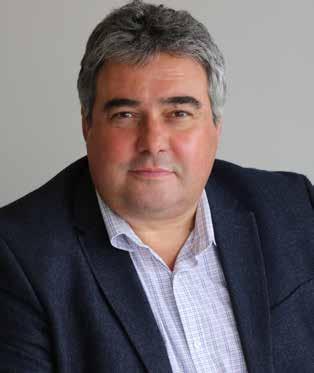

39
THE FIRST DRIVE THROUGH CONCRETE, MORTAR & SCREED SOLUTION LAUNCHES IN IRELAND AT BOYLES OF TRALEE
George Boyle established Boyles Hardware in Killorglin, Co. Kerry in 1964. Following the success of this award winning store and having recognised the potential of the growing town of Tralee, George opened a second branch in Tralee in 1994.
Boyles of Tralee remains a family-run business today. The store is now managed by Adrian Boyle and has earned a reputation for expertise and friendly staff over the years. Boyles of Tralee is now firmly an integral part of Tralee life.
The team at Boyles of Tralee share more than 70 years of hardware and DIY experience, and enjoy putting this knowledge to good use each and every day.
Following a major revamp and extension of the store in 2013, Boyles of Tralee offer a comfortable, modern and enjoyable shopping environment for both trade and public customers.
Alongside hardware and plumbing departments and a fully stocked builder’s merchants, the Tralee store now boasts an extensive door and floors section, a stove centre, paint centre, and a bathroom showroom.
The store is conveniently located in Clash Industrial Estate on the outskirts of Tralee town, easily accessible from the recently opened Tralee bypass road.
We continue to promote new products during the year by holding demonstration days for all of our customers to attend. This ensures that all of our customers are kept up to date on all current and future trends in the building and DIY industry.
Boyles of Tralee have recently expanded into an adjacent site which will create a large space for the new fibo Collect plant in a convenient location in the centre of the yard.
fibo Collect launch at Boyles of Tralee
Landscapers, Builders and DIY enthusiasts across North Kerry face the same common challenges when it comes to mixing small loads of concrete, mortar and screedThe time-consuming hassle of mixing it on site, minimum 1m3 orders, small load charges, long waiting times for collections and deliveries. The solution to all of these issues is the fibo Collect Drive Thru Concrete, Mortar and Screed system.
fibo Collect is an automated batching plant, with selfcleaning technology that allows customers to order small to large quantities of concrete, mortar or screed at the touch of a button. With orders from 0.25m3 Boyles of Tralee are revolutionising convenience - Their new onsite service will allow customers to instantly mix, pour & dispense small volumes of concrete so that they can start their projects in a matter of minutes not hours.
How it works
Boyles of Tralee customers will be able to access the collection service following a simple 3-step method in the branch:
1. Place an order at the counter and collect your barcode
2. Position your vehicle or tub under the conveyor belt
3. Scan your barcode at the fibo Collect touch screen terminal to start mixing
For most small loads of concrete, mortar or screed, the entire mixing and pouring process can be completed in under 5 minutes.
Customers will be able to collect their concrete, mortar or screed on the back of a trailer, a flatbed truck or pour directly into a mortar tub which can be loaded onto their vehicle at the branch.
LOCATION: BOYLES OF TRALEE – CLASH INDUSTRIAL ESTATE, TRALEE, CO.KERRY - V92 ND61
www.civilandconstruction.ie 40 INNOVATION

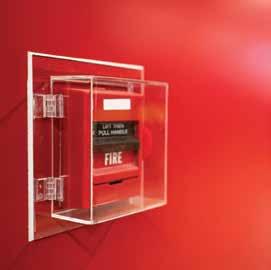



































Irish owned and managed, Automatic are exclusively dedicated to the fire protection business. Our engineers and designers are recognised as experienced and respected individuals among their peers within the construction industry. As a Loss Prevention Certification Board (LPCB) Level 4 Certified contractor (highest accreditation level available), we are permitted to design, install, commission and self-certify all of our works on all categories of sprinkler systems, without third-party certification or supervision.

Unit 3 Park West Road, Park West Industrial Park, Dublin D12 DH93, Ireland. T +353 (1) 45 33 108 E info@automaticfire.ie W www.automaticfire.ie Automatic DETECT | ALERT | CONTROL | EXTINGUISH
FIRE
SPRINKLER DIVISION | GAS SUPPRESSION DIVISION | SERVICE & MAINTENANCE
ONE COMPANY 4 GREAT DIVISIONS
ALARM |
F I
E
I S I O N C O M M I S S I O N M AI N T AI N I N S T A L L DESIGN | INSTALL | COMMISSION | MAINTAIN DE SI GN
REALARMDIVISION SERVICEMAINTENANC
SPRINKLERDIVISION GASSUPPRESSIONDIV
Benefits to the environment
The rising CO2 impact of cement waste and heavy environmental cost of delivering small quantities around North Kerry can be addressed with this Drive Through alternative. Here are some ways the concept can support the environment:
• Waste Reduction: The Drive Through system can minimize production waste through precise material weighing, in contrast to traditional ‘self-mixing on site’ practices that often lead to over-ordering and material wastage.
• Transport Efficiency: The convenient location of the Tralee branch means customers can cut down on the transport miles required and it reduces the need for larger delivery vehicles to be on the road.
• Water Sustainability: fibo Collect’s water recycling and self-cleaning technologies promote a more sustainable manufacturing process.
About fibo Collect
The machines are manufactured by fibo Intercon A/S, a Danish company that is internationally recognised as a leading global partner in innovative concrete technology. ‘fibo Collect’ has helped the company secure several digital innovation awards. The concept launched in the UK in early 2023 and there are now 7 units in operation across the UK, with more on the way.
The technology is ideally suited for location in local builder’s providers where it provides an additional service to customers and allows the Builder’s Providers to become a One Stop Shop for their customers. The technology is anticipated to drive additional footfall and associated revenue for Builder’s Providers who adopt this technology.
Boyles of Tralee will be the Ireland launch customers for the technology and driven by Adrian and his team it is expected to be a great success for both Boyles of Tralee and their customers.
We aim to expand the technology nationwide and to continue to innovate and look at how this technology can be further developed to help build a more sustainable construction model that minimises our carbon footprint.

42 INNOVATION www.civilandconstruction.ie
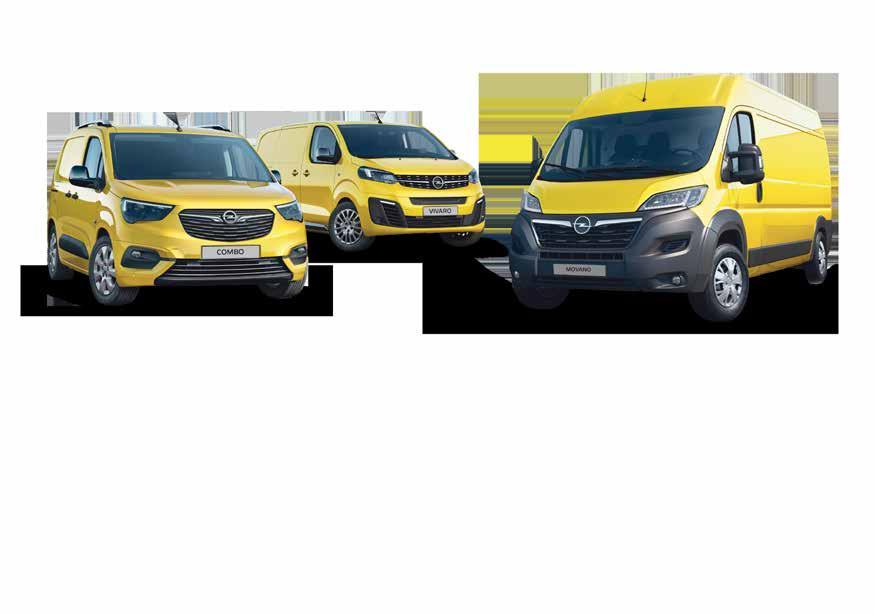


WE HAVE YOUR VAN DISCOVER THE OPEL LCV RANGE NOW AT YOUR LOCAL OPEL DEALER

KIA EV9
The Kia EV9 is a striking, large electric crossover, and follows Kia’s award winning EV6 as the next vehicle in its lineup of new-generation EVs.
44 PEUGEOT E-2008 KIA EV9

“This is a seriously impressive all-electric family SUV.”
The Kia EV9 is big in every sense, 5.1m long, almost 2m wide and 1.8m tall. It makes the firm’s other SUV, the Sorento, seem small. Kia’s styling takes a bold new leap with the EV9, there’s nothing quite like this on the road at present. So if presence is what you are after, this delivers just that. With a muscular body and impressive stance, the EV9 really brings the wow-factor. It’s rugged yet sophisticated, with clean-cut and smooth lines, bringing plenty of detail and style. The ‘Digital Pattern Lighting Grille’ at the front coupled with the EV9’s ‘Digital Tiger Face’ gives a futuristic feel. The Digital Tiger Face is made up of small cube lamps with corresponding bodywork to give a new and modern lighting pattern, which will be featured on future Kia EV models.
On the inside the cabin has a premium feel to it, the plastics top notch, and most with ‘eco’ credentials. There is the usual twin touchscreen set up. Buttons have been kept to a minimum with a few to quickly adjust the ventilation and audio volume, and some more on the wheel for the usual stuff. The rest is in the touchscreen area, which is all rather straightforward in that home screen and sub-menu manner. The dashboard design is quite minimalist with a lot of space and storage integrated into the design. There are handy charging points for mobiles throughout the cabin, including in the third row, so even the passengers at the very rear of the vehicle won’t miss out on all the fun tech the EV9 has to offer.
The EV9 is the company’s first three-row electric flagship SUV. The spacious, and striking EV9 is a rugged, sophisticated, and technologically advanced electric vehicle. Available as a six or seven-seater, it combines bold styling, premium versatility, multifaceted connectivity, and Kia’s signature ‘Opposites United’ design to deliver a vehicle that’s ready for anything, with a projected driving range of up to 563 kilometres*.
The entry level model for the Irish market is the generously equipped 7-seater ‘Earth’ model. Standard equipment includes 19” alloy wheels, Triple Panoramic Display, Heated Front and Second Row Seats, Ventilated Driver and Passenger Seats, Head Up Display, 360 degree Surround View Monitor and Premium Meridian Sound system. Standard safety equipment includes Blind-spot Collision Avoidance with Blind Spot View Monitors, LED headlamps with wide projections and high beam assist and Highway Driving Assist 3. The Earth model comes on the market at €77,500.
The AWD 384PS GT-line model at €85,500 offers a choice of 6 and 7 seats. Additional spec for this trim level includes GT-line styling, 21” alloy wheels, Dual Sunroofs, Intelligent Adaptive Front Headlights and Remote Smart Parking Assist 2. The 6-seater version adds extra comfort for the second-row passengers and these two seats can be swivelled around to face the two rear seats when the vehicle is stationary.
“The EV9 sets new standards for the segment while

completely redefining it,” said Ronan Flood, Managing Director of Kia Ireland. “There has always been a demand from families in Ireland for 6 and 7 seater vehicles, and if these families seek to change to electric, the EV9 is an attractive proposition for them. In recent years Kia has proved itself a prime mover in the road to electrification and the EV9 further proves our determination in this regard.”
Electrification has revolutionised the large SUV space, with the Kia EV9 feeling faster, more responsive and more enjoyable to drive than you might expect from such a big vehicle. The RWD model has a lighter-feel when driving it – which might offer less power, but definitely doesn’t feel sluggish when you plant your right foot. The entry EV9 feels agile on its feet, despite its weight (2310kg), and even acquits itself admirably in tight bends, with little in the way of body role, plenty of grip and responsive steering. The AWD version has great poise and grip but feels significantly faster.
Also really impressive is the cabin insulation, with the interior serene even at motorway speeds, while the ride itself feels well-suited to Irish roads. I think the eagerness of the acceleration will take some new EV owners by surprise, with the EV9 demanding gentle inputs to keep the speed from rocketing skywards, especially in the dual-motor variant.
Kia’s overzealous safety systems, which ping when you travel over what your car thinks is the legal limit can be a bit annoying. I know, it sounds great in theory, but because
www.civilandconstruction.ie
46 KIA EV9
ATHLETE INSPIRED WORKER APPROVED
Zero-compromise athletic safety footwear designed for maximum work performance.







Hultafors Group Ireland Unit B5 Calmount Business Park, Ballymount, Dublin 12 Tel: 01 4098400 Email: info@hultaforsgroup.ie LAB TESTED. REALITY CHECKED. CERTIFIED.
TECHNICAL SPECIFICATION


its speed-sign based, that means pinging every time you pass through a town centre, for example, even if its midnight with nobody about. You can turn it off, but you’ll need to do it every time you turn the car on. But on the whole, this is a seriously impressive all-electric family SUV, and there’s very little to fault here. Sure, the EV9 isn’t cheap. But it is exceptional in terms of the value it offers.
Conclusion
Bigger, bolder and more premium than any Kia before it, there’s little doubting the EV9 was a risk for the Korean brand. But on first impressions, it appears a well-calculated one, and one that proves electric family friendly electric motoring has well and truly arrived.

www.civilandconstruction.ie
48
Two 141.3kw electric motors, 99.8 kWh battery 5.3 seconds €120 per year 200 km/h €85,500 384 hp 700 Nm Model Kia EV9 GT Line 48 KIA EV9
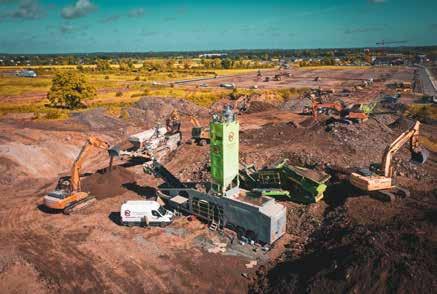

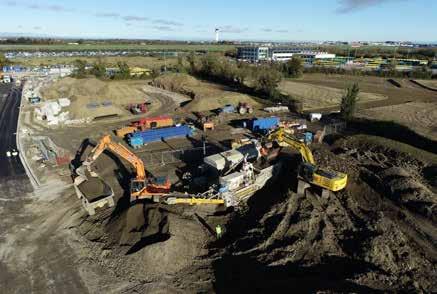


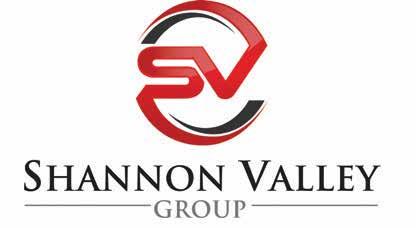
Shannon Valley Group Unit 12 Shannon Valley Centre, Roseville, Turvey Lane, Donabate, Co. Dublin Tel. 01 813 8082 www.shannonvalley.ie
R
are providing our Clients with ESG compliance solutions, helping them to achieve their carbon emissions goals and to engage in the Circular Economy
IRELAND'S BEST SPECIALIST STABILISATION CONTRACTO
We

OUTLOOK FOR UK & IRELAND CONSTRUCTION INDUSTRY 2024
The outlook for the construction industry in the UK and Ireland in 2024 is generally positive, with both regions expected to see significant growth and some new challenges.
United Kingdom
The UK construction industry is predicted to rebound in 2024 after a challenging 2023. Several factors contribute to this optimistic outlook: Growth projections, technological investments, diversity and inclusion and sustainability focus.
The industry is expected to grow by 8% in 2024 and another 7% in 2025. This growth is driven by an increase in larger project starts and a strengthening UK economy with reduced inflation. The decline in 2023 was primarily due to high inflation and supply chain disruptions. However, the anticipated economic recovery, characterised by reduced inflation and increased consumer spending, is expected to boost the construction sector significantly. Technological advancements are one of the key drivers of growth in the UK construction industry. There is a strong trend towards digital transformation within the industry.
Investments in construction management software and cloud technology are expected to increase, aiming to improve efficiency, productivity, and profit margins.
Diversity and inclusion efforts to address the labour and skills shortage include increased recruitment of women and accommodations for neurodivergent employees, which are seen as critical to closing the skills gap in the industry.
Sustainability initiatives such as decarbonisation remains a high priority. Over 80% of industry stakeholders view reducing carbon emissions as crucial, although there is a need for more guidance on implementing these measures effectively.
Ireland
Ireland is expected to experience the strongest construction growth among 19 European countries with construction output forecast to expand by 4.4% in 2024. This growth is supported by significant developments in residential sector, with new housing completions estimated to rise by 7.9% in 2024. The increase in housing project
50 SURETY BONDS www.civilandconstruction.ie
is a response to the high demand for residential properties, driven by population growth and urbanisation.
The improvements in the availability of materials, greater cost certainty and the availability of development financing are expected to support the growth in the Irish construction sector. The challenges faced in 2023, such as supply chain and material shortages, are anticipated to ease, providing a more stable environment. This stability is crucial for developers and financiers to plan and execute projects effectively.
The upcoming revision of the Energy Performance of Buildings Directive is set to drive significant growth in refurbishment and alteration projects. This directive aims to make all new buildings emission-free by 2030 and transform existing building stock into zero-emission buildings by 2050. Compliance with these stringent energy efficiency standards will require substantial investment
renovating older buildings, thus creating new opportunities for the construction sector.
While the outlook for the construction industry in both the UK and Ireland is positive, several challenges remain. The ongoing labour and skills shortage, although being addressed through diversity initiatives and apprenticeships still poses a significant challenge. Moreover, the industry must navigate the complexities of new regulatory requirements and ensure that sustainability goals are met without compromising on project timelines and budgets. In conclusion, the construction sectors in the UK and Ireland are set for a period of robust growth and transformation in 2024 and beyond. Economic recovery, technological advancements, and a strong emphasis on sustainability are key drivers of this positive outlook. However, addressing the labour shortage and effectively implementing new regulations will be critical to sustaining this growth and achieving long-term success.

51 www.civilandconstruction.ie
Construction Begins At Sensational Kids
National Child Development Centre
Sensational Kids, a leading provider of developmental assessments and therapies for children, is proud to announce the commencement of construction at its National Child Development Centre in Kildare Town. Aptly titled “We Have Lift Off,” the groundbreaking ceremony marks a significant milestone in the organisation’s journey to expand its services and reach more children in need.
The National Child Development Centre, a cutting-edge facility spanning 17,000 sq ft on a 2.4-acre greenfield site just off the M7 motorway, is expertly designed by eml architects to meet the evolving needs of children and adolescents supported by Sensational Kids. The project is being spearheaded by Flynn, ensuring the highest standards of construction.
Michael Landers, Managing Director of eml architects, expressed excitement about the collaboration, stating,
“eml architects are delighted to collaborate with Sensational Kids on their new Headquarters. The building will create a Centre of Excellence for Sensational Kids to provide services to the highest level. It will be an exemplar in the provision of therapeutic supports to children, as well as being fun and uplifting for staff, and visitors. It is of significant design quality to reflect the high-profile nature of the site as a Gateway to Kildare town. We look forward to realising the project with the entire Team”.
Mick Flynn, Chief Operating Officer of Flynn, echoed this sentiment, saying, “We at Flynn are delighted to be partnering with Sensational Kids on this groundbreaking project. Knowing that our work will directly contribute to improving the lives of so many children is incredibly rewarding. We look forward to delivering a facility that meets the highest standards and fulfils the unique needs of Sensational Kids and the children they serve”.
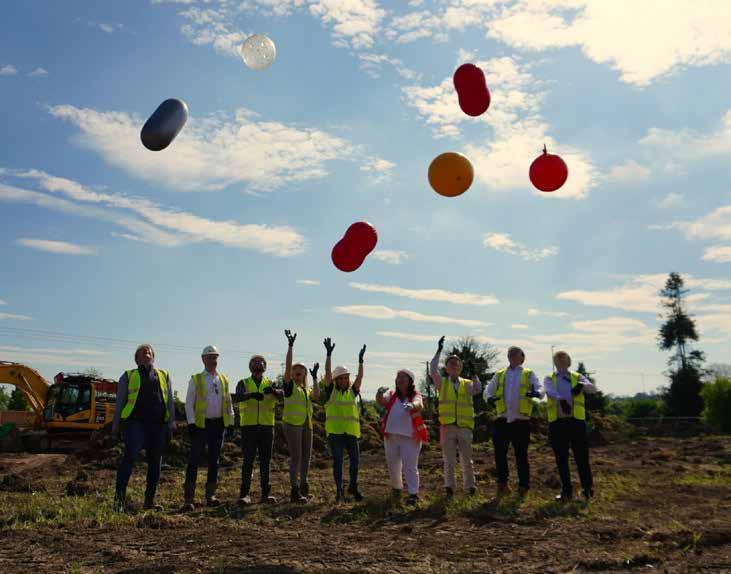
52 NEWS
www.civilandconstruction.ie

Key features of the new centre include 11 Therapy Rooms, 4 Sensory Motor Therapy Gyms, a Sensory Room, Therapeutic Kitchen, Training Rooms, Play, Develop & Learn Store, Therapeutic Playground, and Sensory Gardens.
Karen Leigh, CEO and Founder of Sensational Kids, shared her vision for the future, stating, “Sensational Kids was founded by parents with a vision for a better future for children with additional needs who need therapy supports, to help them reach their potential. It has been our privilege to support over 10,000 children since we first opened our first child development centre in Kildare Town 16 years ago.
Just like the children we have supported are growing, so has the demand for our services grown, along with our vision for how best to support our families and children. We are now embarking on our most ambitious project to date; to build a flagship National Child Development Centre, to change the lives of 30,000 children over the next 10 years. We are doing this because we believe that access to essential therapies like speech & language therapy and occupational therapy are a fundamental right and should not be a privilege denied to many or something that families must fight for. We also believe in providing children
with a fun therapeutic environment that is designed and equipped to help them achieve success.”
The new centre aims to support over 300 children per week, providing 13,000 therapy sessions annually for children in need. Additionally, it will equip thousands of parents, teachers, SNAs, and clinicians with the knowledge, skills, and resources needed to better support the children in their care.
Addressing the demand, Sensational Kids remains committed to its mission of making developmental assessments and therapies accessible to all, ensuring that no child is left behind. The groundbreaking ceremony marks a significant step towards fulfilling this commitment and expanding their reach to positively impact the lives of even more children.
With the National Child Development Centre currently 60% funded, Sensational Kids is calling for donations to complete this transformative project. The centre offers an incredible opportunity for strategic, tangible giving that will deliver long-lasting impacts for thousands of children and families for many years to come.
www.civilandconstruction.ie 53
OMC expands portfolio with acquisition of Galway’s most established Consulting Engineers Practise
OMC Group, a leading multidisciplinary consulting engineering company, has completed the successful acquisition of prominent consulting engineers business, James Roche Consulting Engineers, a venerable institution in Galway since the late 1970s.
The acquisition of James Roche Consulting Engineers, represents a significant addition to OMC’s portfolio. With four talented professionals joining the OMC Group, this strategic integration leverages synergies to enhance service offerings and solidify OMC’s position as a leader in the consulting engineering sector.
Looking ahead, OMC remains dedicated to its growth trajectory, with plans to complete two additional acquisitions in 2024. Additionally, the company’s expansion efforts are expected to create 20 new jobs nationally.
Founded in 2012 as Enda O’Malley and Associates, the company rebranded to OMC in 2023, signifying its evolution and dedication to excellence and innovation in professional consulting engineers services. OMC completed its first acquisition in late 2022 with the incorporation of O’Halloran Engineering, a pivotal milestone that laid the groundwork for future growth initiatives.
With a in house team of 18 dedicated professionals, OMC’s core business encompasses a diverse range of residential and commercial projects, delivering services in planning consultancy, environmental consultancy, structural design, building surveying, land mapping, assigned certification, fire and disability consultancy, mechanical and electrical consultancy, energy consultancy, and health and safety consultancy.
“We are delighted to welcome James Roche BE and his staff to the OMC Group. James Roche Consulting Engineers has been a well-respected and long established consulting engineers practise within Galway since the late 1970s and his reputation and network will enhance OMC’s service offering throughout Galway, ” said Enda O’Malley, Founder and CEO of OMC. “This acquisition exemplifies our strategic approach to expansion, focusing on leveraging synergies and fostering growth opportunities. We are committed to retaining talent, fostering innovation, and creating new employment opportunities as we continue to strengthen our presence as a leading multidisciplinary consulting engineers company in the West of Ireland.”
OMC have offices in Clifden, Galway City and Dublin and oversee projects throughout Ireland. For more information about OMC and its services, visit www.omcgroup.ie

www.civilandconstruction.ie 54 NEWS

